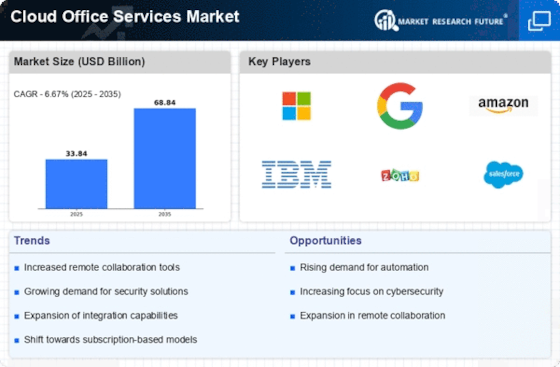Market Share
Cloud Office Services Market Share Analysis
The Cloud Office Services market is shaped by a myriad of factors that collectively define its growth trajectory and influence its dynamics. One of the primary driving forces is the increasing demand for flexible and collaborative work environments. As businesses globally transition to remote and hybrid work models, the need for cloud-based office services becomes paramount. These services, encompassing tools like email, document collaboration, and communication platforms, empower organizations to provide seamless and accessible work solutions to employees, fostering productivity and collaboration.
Cost considerations play a pivotal role in the dynamics of the Cloud Office Services market. Cloud-based solutions offer a cost-effective alternative to traditional on-premises office infrastructure, eliminating the need for extensive hardware investments and maintenance. The pay-as-you-go model allows businesses to scale their services based on actual usage, providing a more efficient and budget-friendly approach to managing office-related IT resources.
Scalability is another significant factor influencing the Cloud Office Services market. The ability to scale services up or down based on the evolving needs of businesses is a key advantage of cloud solutions. Whether an organization is expanding its operations, undergoing a digital transformation, or adapting to changing workforce sizes, cloud office services provide the flexibility to adjust resources accordingly, ensuring optimal efficiency.
Security considerations are paramount in the Cloud Office Services market, given the sensitive nature of business data stored and processed in the cloud. Service providers invest heavily in robust security measures, including encryption, multi-factor authentication, and continuous monitoring, to safeguard against data breaches and unauthorized access. As cyber threats evolve, the ability of cloud office services to maintain high-security standards becomes a critical factor in their adoption.
Interoperability is a key consideration influencing the Cloud Office Services market. Businesses often use a variety of tools and applications, and seamless integration between different cloud office services is essential for a cohesive and connected work environment. Compatibility with existing software ecosystems and the ability to collaborate across platforms contribute to the overall attractiveness of cloud office services.
Technological advancements and innovation are inherent to the Cloud Office Services market. Ongoing research and development efforts focus on enhancing the features and capabilities of cloud office tools. Integration of artificial intelligence, machine learning, and automation contributes to the evolution of these services, offering advanced functionalities such as predictive analytics, smart content suggestions, and intelligent workflow automation.
Competition among cloud service providers shapes the overall landscape of the Cloud Office Services market. Well-known providers such as Microsoft, Google, and Amazon, along with numerous other players, vie for market share by continuously improving their offerings and expanding service portfolios. Strategic collaborations, partnerships, and acquisitions contribute to the competitive dynamics, influencing the choices available to businesses seeking cloud office solutions.
Regulatory compliance and data sovereignty impact the Cloud Office Services market, particularly as regulations related to data protection and privacy evolve. Service providers must adhere to regional and international standards to ensure the secure handling of user data. Compliance with regulations such as GDPR (General Data Protection Regulation) is crucial for building trust and meeting legal requirements, influencing the adoption of cloud office services.
Environmental sustainability is gaining prominence as a market factor. Cloud service providers are increasingly adopting green initiatives, utilizing energy-efficient data centers, and incorporating renewable energy sources to minimize their environmental impact. Businesses, in turn, consider the sustainability practices of cloud office service providers as part of their commitment to corporate social responsibility.


















Leave a Comment